

TWV Podcast Episode 415: Fish oil, Healthy or not? Nutrition and Exercise Science for Everyone. You will probably remember both my previous article about the "rancidity" problem with over-the-counter fish oil products (see "3/3 TOP-Selling US Fish Oils Exceed Maximal Peroxide and Total Oxidation Levels - Levels Roughly 4000% Higher Than in Medical Grade N3 Supplements, Harvard Study Shows" | read more), as well as my often-phrased general skepticism about the usefulness of high dose (>1-2g/d) fish oil supplements.

You can learn more about omega-3 & co. at the SuppVersity Krill vs. Fish Oil - Is one Better? How to Avoid N3 Oxidation N3/N6 Ratio Doesn't Matter!? Nutrition and Exercise Science for Everyone.
Nutrition and Exercise Science for Everyone. Fish Oil, Krill Oil, and Hepatitis C. Few things in paleo-land are as endlessly debatable as whether supplementing fish oil or cod liver oil is a good idea.
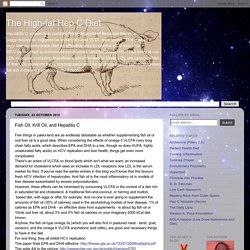
When considering the effects of omega-3 VLCFA (very long chain fatty acids, which describes EPA and DHA to a tee, though so does HUFA, highly unsaturated fatty acids) on HCV replication and liver health, things get even more complicated. There's an action of VLCFA on blood lipids which isn't what we want; an increased demand for cholesterol which sees an increase in LDL-receptors (low LDL is the serum marker for this). If you've read the earlier entries in this blog you'll know that this favours fresh HCV infection of hepatocytes. And fish oil is the most inflammatory oil in models of liver disease exacerbated by excess polyunsaturates.
However, these effects can be minimised by consuming VLCFA in the context of a diet rich in saturated fat and cholesterol. For one thing, they all inhibit HCV replication. Should we ever supplement fish oils? (click on "look inside" link). Nutrition and Exercise Science for Everyone. For SuppVersity Veterans, it's no news that phospholipid-bound omega-3 fatty acids (as in krill oil) have a superior bioavailability compared to triglyceride bound ones (as in fish oil) - you've read about that in in June 2012 in an article titled "Phospholipid or Triglyceride" (go back and read it!).
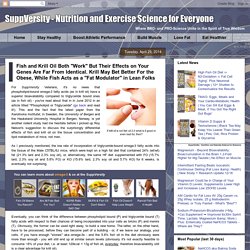
This and the fact that the latest paper from the Karolinska Institutet, in Sweden, the University of Bergen and the Haukeland University Hospital in Bergen, Norway, is yet another rodent study had me hesitate before I picked up Roy Nelson's suggestion to discuss the surprisingly differential effects of fish and krill oil on the tissue concentration and lipid metabolism of mice, not men. Nutrition and Exercise Science for Everyone. Marksdailyapple. Marksdailyapple. Evolutionary Psychiatry: Just Eat Fish. I've covered the importance of omega 3 fatty acids in the brain a number of times.

However, when anyone asks me for specific recommendations, I've had to be distressingly vague. Typically I hem and haw and suggest that someone try to eat plenty of clean cold water marine fish, but if one wants to supplement, it's likely that a mix of EPA/DHA is better than DHA alone despite the fact that DHA is by far the major omega 3 in the brain. But how much do we supplement? Who knows? See, the literature on fish oil supplementation is such a mish-mash of different doses and results than one would have to dedicate a zillion hours scanning through the literature, and frankly, there are better things to do. To fish oil, or not to fish oil. The nutrition world is awash in fish oil worship.
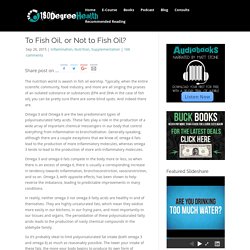
Typically, when the entire scientific community, food industry, and more are all singing the praises of an isolated substance or substances (EPA and DHA in the case of fish oil), you can be pretty sure there are some blind spots. And indeed there are. Omega 3 and Omega 6 are the two predominant types of polyunsaturated fatty acids. These fats play a role in the production of a wide array of important chemical messengers in our body that control everything from inflammation to bronchodilation.
Generally-speaking, although there are a couple exceptions that we know of, omega 6 fats lead to the production of more inflammatory molecules, whereas omega 3 tends to lead to the production of more anti-inflammatory molecules. Omega 3 and omega 6 fats compete in the body more or less, so when there is an excess of omega 6, there is usually a corresponding increase in tendency towards inflammation, bronchoconstriction, vasoconstriction, and so on. Omega-3 Foods: Top 15 Omega-3 Foods + Omega-3 Recipes. Omega-3s are “essential” fatty acids because the body isn’t capable of producing them on its own.
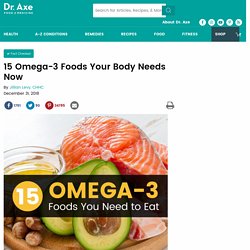
Therefore, we must rely on omega-3 foods in our diets to supply these extremely beneficial compounds. There are actually three different types of “omega-3s”: alpha-linolenic acid (ALA), docosahexaenoic acid (DHA) and eicosapentaenoic acid (EPA). The preferred sources are DHA and EPA, the kinds found in seafood sources like salmon and sardines. ALA, on the other hand, is found in some plant foods, including certain nuts and seeds, as well as high-quality cuts of meat like grass-fed beef. Essential fatty acids: not so essential after all. Are All PUFA bad. A Scandinavian 180D reader recently wrote in with a series of questions.
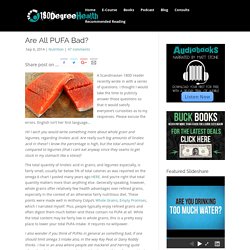
I thought I would take the time to publicly answer those questions so that it would satisfy everyone’s curiosities as to my responses. Please excuse the errors. English isn’t her first language… Hi! I wich you would write something more about whole grain and legumes, regarding linoleic acid. The total quantity of linoleic acid in grains, and legumes especially, is fairly small, usually far below 5% of total calories as was reported on the omega 6 chart I posted many years ago HERE. I also wonder if you think of PUFAs in general as something bad, if one should limit omega 3 intake also, in the way Ray Peat or Dany Roddy thinks.
Theoretically-speaking, I do think all PUFA can generally be regarded as not ideal by virtue of the fact that they are highly unstable and lead to faster aging via the production of lipid peroxides. Lastly, don’t get too enamored with long-lived peoples. Substitution of linoleic acid with α-linolenic acid or long chain n-3 polyunsaturated fatty acid prevents Western diet induced nonalcoholic steatohepatitis. Fish Oil and Pregnancy. Why fish stomps flax as a source of omega-3. How too much omega-6 and not enough omega-3 is making us sick. How much omega-3 is enough? That depends on omega-6. An Update on Omega 6 PUFAs. Put Your Fish Oil to The Test. Did you know that you can and should test your omega-3 capsules at home to determine the form and quality of the oil inside?

This is extremely important because while the triglyceride form of omega-3 has been shown to be beneficial at improving heart health, preventing Alzheimer’s disease and reducing stress, anxiety and depression, the ethyl ester form (which is still widely used in many popular brands) can actually produce negative health consequences! Plus: Fishes that Come Close are Sardines, Rainbow Trout, ... - SuppVersity: Nutrition and Exercise Science for Everyone. No, I am not a fish oil fanboy, that's for sure.

But how can you be if your chances to get already oxidized fish oil are 100% if you buy any of the US TOP-sellers (and assume that it's not different in Europe). Speaking of which: There's new research allowing us to add two new and potentially important criteria to the inofficial SuppVersity-"How to buy and use your fish oil" guide. Which Omega-3 is Better For Lowering Triglyceride Levels? We get asked this question a lot, “Which omega-3 should I take in order to reduce my triglycerides?”

Is there a difference between plant-based oils, like flaxseed, chia seed, hemp seed or even echium seed oil, and traditional fish oils? Our answer is a resounding YES! There is currently little evidence that plant-based oils, like flaxseed, chia seed, hemp seed or echium seed oils, help to lower high triglyceride levels. This is because plant-source omega-3s do not contain EPA or DHA, the ‘long-chain’ omega-3 fatty acids that are present in fish oil, which have been shown to produce the triglyceride-lowering effects and anti-inflammatory effects in the body. Instead, these plant-based seed oils contain a ‘short-chain’ omega-3 called ALA (alpha-linolenic acid), which must be converted within the body to EPA, and then to DHA. However, this conversion is problematic because this conversion is very inefficient. 1. 2. 3 People That NEED Omega-3 Supplements. As you know, we always love sharing the latest research with you on essential micronutrients.
In this blog we are discussing the essential fatty acid: Omega-3. So, here you go…here are 3 new studies that explain why 3 specific types of people need to supplement with Omega-3! If you fit into any of these categories pay special attention because, for you, the reasons to supplement go far beyond the much-touted anti-inflammatory super power of omega-3 fatty acids. 1. If you live in a Big City or are exposed to air pollution. A recent study out of the Laboratory for Lipid Medicine and Technology at Massachusetts General Hospital, found that supplementing the diet with omega-3 fatty acids could prevent the tissue and organ damage caused by air pollution. 2. Hyperlipid: Essential fatty acids are essential.
If you take a cow and feed it on grass it gets quite a lot of omega 3 fatty acids. If you feed it on a barley based concentrate feed it doesn't get nearly so many, just loaded up on omega 6s. Because cows have a rumen they actually live on a combination of volatile fatty acids produced by bacteria, which breaking down that otherwise useless fiber in grass, plus bacterial protein. Not much of the grass itself actually gets through to the cow. Most bovine fat is self assembled from things like butyric acid or acetate, so it's fully saturated or monounsaturated, ie typical mammalian produced fat. But some essential fatty acids do get through, after all they're essential to the cow just as much as they are to you and me. How much PUFA get through the intensely reducing environment of the rumen? Table 1 shows the amounts of linoleic and linolenic acids in grass, concentrates and sliage.
Concentrates don't. What comes out of the rumen? Back to cattle. Weighing in on the Fermented Cod Liver Oil (FCLO) Controversy. Fish and Krill Oil Both "Work" But Their Effects on Your Genes Are Far From Identical. Krill May Bet Better For the Obese, While Fish Acts as a "Fat Modulator" in Lean Folks - SuppVersity: Nutrition and Exercise Science for Everyone.
Male fertility ~ a fishy business – Rosemary Cottage Clinic Blog. The extraordinary decline in male fertility over the last century has coincided with a major shift in our dietary polyunsaturated fatty acids intake away from omega-3’s (found in seafood) towards omega 6’s (found in vegetable seed oils). In this post I cast my net wide and haul in a boat-load of evidence linking PUFAs to sperm function. In a previous post I looked at some of the emerging research around the omega 6 to 3 ratio: Omega-6 and Omega-3 PUFAs: Five recent research papers Two of those papers point to the link between maternal nutrition and the health of the offspring. In our seafood videos (part 3) we go into considerable detail around the mechanism by which females accumulate DHA in their gluteofemoral (hip and thigh) fat stores laid down in puberty, and the effects of seafoods on maternal and infant brain function and that all important IQ. How seed oils contributed to the omega-6 imbalance This graph should give us all pause for thought.
Too Much of a Good(?) Thing: When Fish Oil Starts Clogging Your Arteries and Fattening Up Your Liver. - SuppVersity: Nutrition and Exercise Science for Everyone. If you are no regular visitor of the SuppVersity, I guess, you are religiously taking your (high dose?) Fish oil, day in day out. So what? It probably lowers your total and low density cholesterol (LDL-C; it may reduce your triglycerides and thus improve your insulin sensitivity. Yet, in doing all those "great" things, the unmetabolized and peroxidized remainder of everyone's favorite wonder-supplement begin to clog your arteries and liver - at least, if you believe in the validity of that kind of rodent studies which suggested the usefulness of fish oil, in the first place.Shirazi et al.
(Shirazi. 2011) recently published a paper reporting exactly that: "Fish oil increases atherosclerosis and hepatic steatosis, although decreases serum cholesterol in Wistar rat" - The scientists had fed two groups of pregnant rats (and, after birth, their offspring) with either a fish oil containing or a standard, soy oil based diet. Omega-6 and Omega-3 PUFAs: Five recent research papers – Rosemary Cottage Clinic Blog.
Their is a great deal of research coming out about the essential polyunsaturated fatty acids (PUFAs) and I want to share some of the latest papers with you. Background. Omega-3 Fats and Cancer. Omega-3 Fats, Angiogenesis, and Cancer: Part I. Omega-3s, Angiogenesis and Cancer: Part II. DHA and Angiogenesis: The Bottom Line. Can Fish Oil Cause Prostate Cancer? Whenever a newly published health study challenges current thinking, you can bet it won’t be long before the news media starts ratcheting up the drama and jumping to conclusions. This is true of a recent study called “Plasma Phospholipid Fatty Acids and Prostate Cancer Risk in the SELECT Trial,” published in the July 2013 issue of the Journal of the National Cancer Institute.
The Great Fish Oil Experiment. The Great Fish Oil Experiment Reading medical journals and following the mass media, it's easy to get the idea that fish oil is something any sensible person should use. It's rare to see anything suggesting that it could be dangerous.